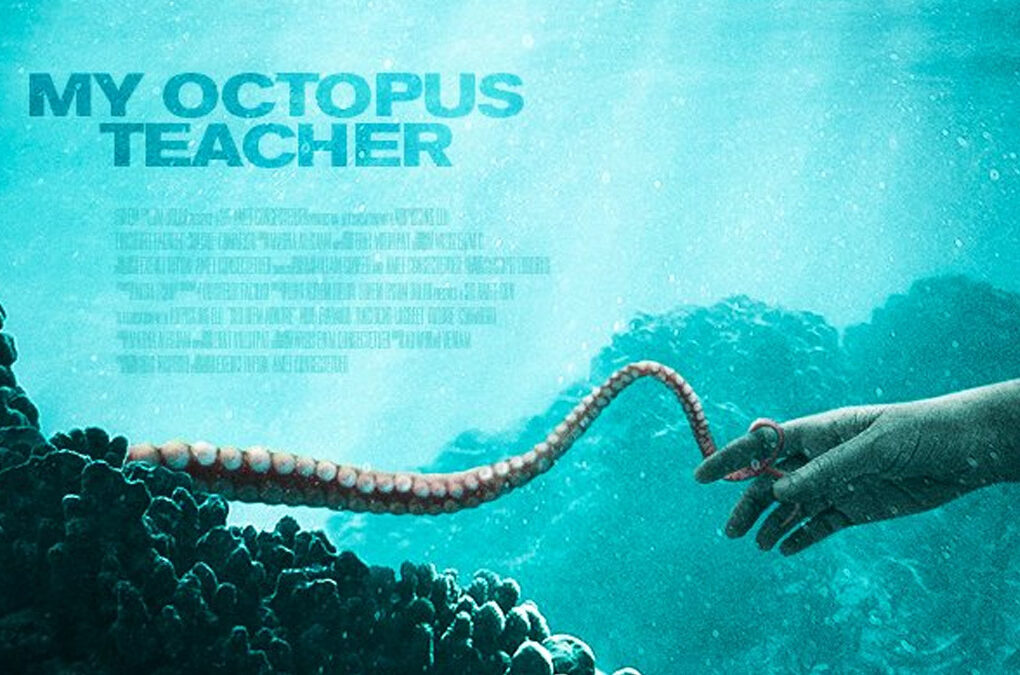Alright, alright, I’ll watch it! Maybe you know the feeling. Something gets recommended to you one too many times to ignore and remain polite. You sense that it will be genuinely awkward to run into the recommender again without having read the article or listened to the podcast in question.
That’s how it was with me and My Octopus Teacher, the documentary that just won the Academy Award. I couldn’t show back up at my exercise group without having seen it. Time to push the reactance to the side, press pause on a third viewing of Mistaken for Strangers, and take the, er, plunge.
I’m so glad I did. An extraordinary piece of filmmaking, My Octopus Teacher tells the story of one man’s relationship with the titular creature, but not how you might think. Craig Foster is the man’s name, and we watch as he encounters an octopus in the waters outside his (absurdly cool and well-situated) “cottage” on the coast of South Africa.
One suspects that resources are not an issue for this diver and documentarian. Instead, he’s grappling with an almost-cliched sense of mid-life dislocation. The film covers the unlikely path taken in his journey back to the human race (and to himself), stopping along the way to bask in an endless parade of technicolor seascapes. Breath-taking in the extreme.
After discovering the octopus by chance in the kelp forest near his preferred diving spot, Craig is captivated and begins to visit its den every day. At first he takes the stance of outward observer. He doesn’t want to upset the octopus’s habitat or inadvertently cause harm. He sees himself as an intruder, albeit a fortunate one. And so he films the creature from a distance, marveling at its intelligence and other-worldliness.
Then something unexpected happens. We watch as the octopus gradually becomes less and less frightened of Craig. Trust builds between man and animal. They develop a bond until one day the octopus reaches out its small tentacle and … touches Craig on the finger.

In that moment the octopus crosses an invisible boundary to make a physical connection with the outsider. There’s something undeniably intimate about the gesture. Craig is surprised, amazed, enthralled, almost shocked.
The octopus, it turns out, was not content for him to remain an impartial bystander. She draws Craig in, and they soon develop the sort of relationship I didn’t think was possible to develop with an octopus, one characterized by a blessed combination of awe, play, and affection.
Barriers broken at the octopus’s initiative, the film reaches its turning point. More than that, Craig’s life reaches a turning point. With tears in his eyes, the otherwise reserved man sums up the breakthrough to the camera:
What she [the octopus] taught me was to feel … that you’re part of this place, not a visitor. [Pause] That’s a huge difference.
You may not feel you belong, the octopus seems to communicate. You may have every reason to feel that way, especially as the representative of a foreign species that has often been an arbiter of death and pollution.
And yet, that judgment may not ultimately be yours to make, Mr Foster.
You see, the octopus’s other-worldliness extends beyond biology, to matters of propriety and deserving. She doesn’t play by Craig’s rules. Craig belongs because she says so, despite his protestations and discomfort. Soon she is wrapped around his hand, refusing to let go as he barrels to the surface for air.
Moreover, the octopus doesn’t seem to need anything from him other than his presence. The sermon wrote itself.
Grace arrives in this wounded man’s life in the unexpected and, yes, surprising form of an eight-armed mollusk. What appears scary and strange brings healing in its wake.
That, and a bunch of pajama sharks.
featured image via Stacey Chomiak

COMMENTS
Leave a Reply












